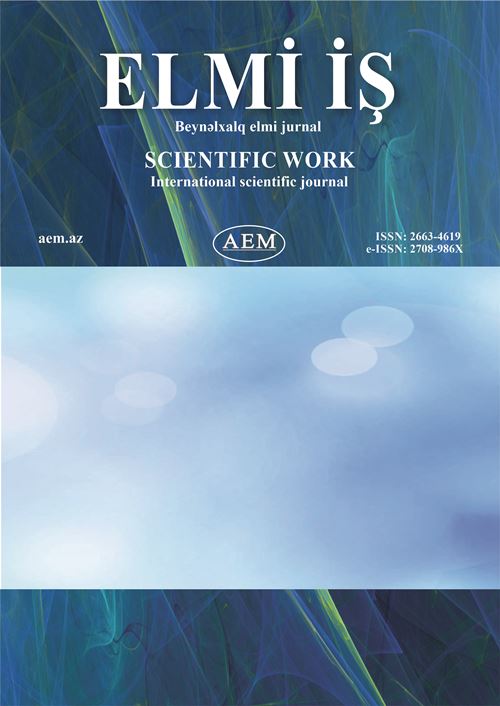DOI: https://doi.org/10.36719/2663-4619/85/103-109
Vüqar Rəfail oğlu Əhmədov
Azərbaycan Respublikasının Prezidenti yanında
Dövlət İdarəçilik Akademiyası
magistrant
Altay Cəmil oğlu Musayev
Azərbaycan Respublikasının Prezidenti yanında
Dövlət İdarəçilik Akademiyası
magistrant
Ələkbər Şahin oğlu Sadıxlı
Azərbaycan Respublikasının Prezidenti yanında
Dövlət İdarəçilik Akademiyası
magistrant
POSTSOVET DÖNƏMİNDƏ CƏNUBİ QAFQAZ RESPUBLİKALARININ GEOSİYASİ SEÇİM İSTİQAMƏTLƏRİ − ƏMƏKDAŞLIQ YOXSA XAOS
Xülasə
Yaşadığımız regionda 200 illik rus nəzarət sisteminin 1991-ci ildə SSRİ-nin süqutu ilə dağılması nəticəsində qüvvələr balansında kardinal dəyişiklik baş verdi. Cənubi Qafqazda, 300 ildən çoxdur ki, xarici üçbucağı təmsil edən Rusiya, Türkiyə, İran üçlüsü ilə bərabər, yeni konfiqurasiya Azərbaycan, Ermənistan, Gürcüstan – daxili üçbucağı əmələ gətirdi. Daxili üçbucaq arasında münasibətlərin formalaşması separatçılıq və etno-siyasi qarşıdurmaların aktivləşməsi fonunda baş verdi ki, bu da öz növbəsində dövlətlər arasında münasibətlərin əməkdaşlıq deyil, qorxu və inamsızlıq qavrayışları üzərində formalaşdırdı. Bütün bunların fonunda daxili üçbucaq ölkələri öz təhlükəsizlik riskləri kompensasiya etmək üçün xarici üçbucaq dövlətləri ilə strateji münasibətlər qurmağa başladılar. Nəticədə regionda iki geosiyasi ox meydana gəldi. Daxili ölkələrdən Azərbaycan, Gürcüstan və xarici üçbucaqdan Türkiyə birlikdə ilk oxu təşkil edir və postsovet dönəmi qərblə əməkdaşlığa önəm verdi. Rusiya və İran daxili üçbucaqdan Ermənistan ilə ikinci oxu yaratdılar ki, bu ölkələr digər qüvvələri regiondan kənar tutma siyasətini həyata keçirdilər. Doğrudur, hər iki geosiyasi oxda da dəyişiklik keçdiyimiz 30 ildə baş vermiş ola bilər, amma yenə baxdığımızda sistemin bu şəkildə köklərinin saxladığını görərik. Ümumiyyətlə, Cənubi Qafqaz dünyanın “partlama” nöqtələrindən biri kimi böyük qüvvələrin milli-dini zəmində yaratdığı münaqişələr ilə tarix boyunca zəngin olub və müasir dövrümüzdə də bu davam edir. Təhlükəsizlik, beynəlxalq hüququn prinsiplərinin yerinə yetirilməsi və bu kimi məsələlər də regionun aktual problemləridir. Davamlı münaqişələrin yaşandığı XXI əsrdə onların həlli üçün bir mexanizm və qarşısının alınması sadəcə zəruridir. Barışıq olmasa, inkişaf ola bilməz və inkişaf olmazsa dünyanı gələcəyə götürmək olmaz. Bu amillər bir-biri ilə mütləq bağlıdır. Məqalədə postsovet dönəmində region dövlətlərinin bir-biri ilə münasibətlərində hansı istiqaməti seçdikləri açıq şəkildə tədqiq edilmiş, Gürcüstan və Azərbaycanın əməkdaşlığı, Ermənistanın isə xaosu necə yaratdığı araşdırılmışdır.
Açar sözlər: Cənubi Qafqaz, Ermənistan, Gürcüstan, Azərbaycan, Rusiya, İran, Türkiyə, təhlükəsizlik
Vugar Rafail Ahmadov
Under the President of the Republic of Azerbaijan
Academy of Public Administration
master student
Altay Jamil Musayev
Under the President of the Republic of Azerbaijan
Academy of Public Administration
master student
Alakbar Shahin Sadikhli
Under the President of the Republic of Azerbaijan
Academy of Public Administration
master student
In the post-Soviet period, the geopolitical choice directions of the South Caucasian Republics − cooperation or chaos
Abstract
As a result of the collapse of the 200 year old Russian control system in the region in which we live in 1991 with the fall of the USSR, a cardinal change in the balance of forces took place. In the South Caucasus, along with the trio of Russia, Turkey, and Iran, which represented the external triangle for more than 300 years, a new configuration of Azerbaijan, Armenia, and Georgia formed the internal triangle. The formation of relations between the internal triangle took place against the background of the activation of separatism and ethno-political conflicts, which in turn shaped the relations between the states on perceptions of fear and mistrust rather than cooperation. Against the background of all this, the internal triangle countries began to establish strategic relations with the external triangle states in order to compensate for the risks of their security. As a result, two geopolitical axes were formed in the region. Azerbaijan and Georgia from the internal countries and Turkey from the external formed the first axis together, and the post-Soviet era emphasized cooperation with the West. Russia and Iran created the second axis of the internal triangle with Armenia, which implemented a policy of keeping other forces out of the region. It is true that changes in both geopolitical axes may have occurred in the last 30 years, but if we look again, we will see that the system has kept its roots in this way. In general, the South Caucasus, as one of the "explosion" points of the world, has been rich throughout history with conflicts created by great forces on national and religious grounds, and this continues in our modern times. Security, fulfillment of the principles of international law, and similar issues are also urgent problems of the region. In the XXI century, where continuous conflicts are experienced, a mechanism for their resolution and prevention is simply necessary. Without peace, there can be no development, and without development, the world cannot be taken into the future. These factors are necessarily related to each other. In the article, in the post-Soviet period, it was clearly studied which direction the regional states chose in their relations with each other, and how the cooperation of Georgia and Azerbaijan, and how Armenia created chaos, was investigated.
Keywords: South Caucasus, Armenia, Georgia, Azerbaijan, Russia, Iran, Turkey, security

